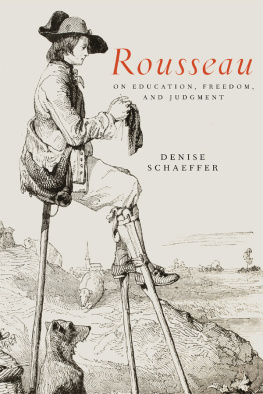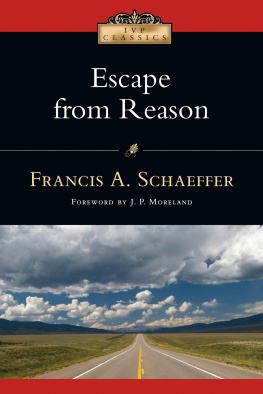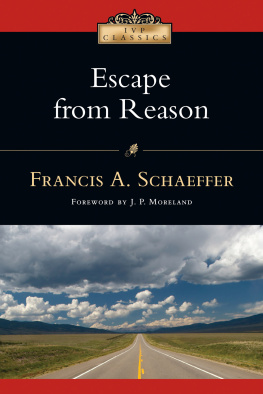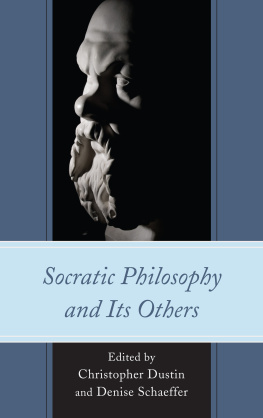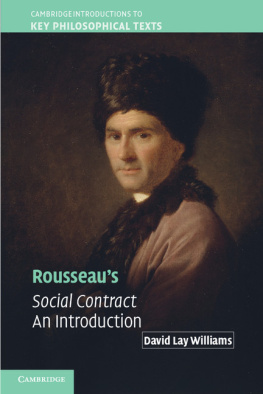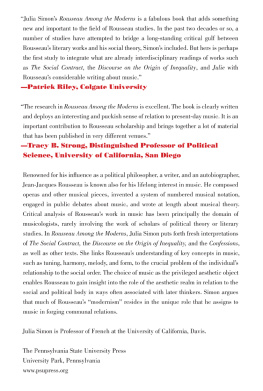
ROUSSEAU
ON EDUCATION,
FREEDOM,
AND JUDGMENT

Rousseau
ON EDUCATION, FREEDOM, AND JUDGMENT
DENISE SCHAEFFER
The Pennsylvania State University Press
University Park, Pennsylvania
Library of Congress Cataloging-in-Publication Data
Schaeffer, Denise, 1968, author.
Rousseau on education, freedom, and judgment /
Denise Schaeffer.
p. cm
Summary: Explores the writings of Rousseau, including Emile, Discourse on the Origins of Inequality, and On the Social Contract, focusing on the problem of judgment and its role in creating the condition for genuine self-ruleProvided by publisher.
Includes bibliographical references and index.
ISBN 978-0-271-06209-9 (cloth : alk. paper)
1. Rousseau, Jean-Jacques, 17121778.
2. Judgment (Logic).
3. Rousseau, Jean-Jacques, 17121778. Emile.
4. EducationPhilosophy.
5. LibertyPhilosophy.
I. Title.
B2137.S33 2014
194dc23
2013032625
Copyright 2014 The Pennsylvania State University
All rights reserved
Printed in the United States of America
Published by The Pennsylvania State University Press,
University Park, PA 16802-1003
The Pennsylvania State University Press is a member of the Association of American University Presses.
It is the policy of The Pennsylvania State University Press to use acid-free paper. Publications on uncoated stock satisfy the minimum requirements of American National Standard for Information SciencesPermanence of Paper for
Printed Library Material, ANSI Z39.481992.
This book is printed on paper that contains 30% post-consumer waste.
CONTENTS

The National Endowment for the Humanities provided support for this project in its earliest stages, which helped me to get the project off the ground. The College of the Holy Cross generously provided research leaves that gave me time to think, write, and revise. Portions of some of the chapters were originally published elsewhere. Most of draws material from two previously published articles, Attending to Time and Place in Rousseaus Legislative Art, Review of Politics 74 (Summer 2012): 42141, and Realism, Rhetoric, and the Possibility of Reform in Rousseaus Considerations on the Government ofPoland, Polity 42 (July 2010): 37797. I would like to thank all of the original publishers for permission to reprint.
Over the years, I have benefited enormously from discussing Rousseau, both informally and at conferences, with many friends and colleagues, including Jonathan Badger, William Baumgarth, Ronna Burger, Michael Davis, Christopher Dustin, Herma Gjinko, Pamela Jensen, Paul Kirkland, Joseph Knippenberg, David Nichols, John Scott, and Stephen Thomas. I owe a particular debt of gratitude to Mary Nichols and David Schaefer, who read the entire manuscript with meticulous care and provided many valuable suggestions. I would also like to thank the Penn State Press reviewers for their helpful feedback; I feel fortunate to have had such attentive and insightful readers. It has also been a pleasure to work with Kendra Boileau and Laura Reed-Morrisson at Penn State Press. I would also like to thank Daniel McMurtry for his assistance with manuscript formatting, and Suzanne Wolk for her excellent copyediting. Finally, I am grateful to my colleagues and students at the College of the Holy Cross for their collegiality and ongoing encouragement.
I have lived with this book for quite some time, and by extension so has my family. I would like to thank my amazing husband, Charles Planck, as well as my daughters, Amanda, Isabel, and Lydia, who have been patient and generous over the years in sharing their mothers attention with this mysterious person named Rousseau. I would also like to thank my parents, Ernesto and Darci Schaeffer, for their love and unwavering support. I dedicate this book to the memory of my father, a self-described philosopher of cars and mechanic of people whose distinctive perspective on the world gave me a taste for philosophical thinking before I knew what it was.
Parenthetical references to the following works are followed by references to volume and page number of the Oeuvres compltes de Jean-Jacques Rousseau, ed. Bernard Gagnebin and Marcel Raymond, 5 vols. (Paris: Gallimard, 195995).
CC | Plan for a Constitution for Corsica, in The Collected Writings of Rousseau, ed. Roger D. Masters and Christopher Kelly, 13 vols. (Hanover: University Press of New England, 19902009), 11:12165. |
E | Emile, or On Education, ed. and trans. Allan Bloom (New York: Basic Books, 1979). |
ES | Emile and Sophie, or The Solitaries, trans. Christopher Kelly, in The Collected Writings of Rousseau, ed. Roger D. Masters and Christopher Kelly, 13 vols. (Hanover: University Press of New England, 19902009), 13:685721. |
GP | The Government of Poland, trans. Willmoore Kendall (Indianapolis: Hackett Publishing, 1985). |
PE | Discourse on Political Economy, trans. Judith R. Bush, Roger D. Masters, Christopher Kelly, and Terrence Marshall, in The Collected Writings of Rousseau, ed. Roger D. Masters and Christopher Kelly, 13 vols. (Hanover: University Press of New England, 19902009), 3:14070. |
SC | On the Social Contract, trans. Judith R. Bush, Roger D. Masters, and Christopher Kelly, in The Collected Writings of Rousseau, ed. Roger D. Masters and Christopher Kelly, 13 vols. (Hanover: University Press of New England, 19902009), 4:127224. |
SD | The First and Second Discourses, trans. Roger D. Masters and Judith R. Masters (New York: St. Martins Press, 1964). |
The general will is always right, but the judgment that guides it is not always enlightened. It must be made to see objects as they are, or sometimes as they should appear to be.... From this arises the necessity for a legislator. (SC, 154; 3:380)
The idea of democracy presupposes that human beings are capable of exercising judgment, since it requires citizens who are capable of making judgments about a shared public world. The question of how to foster this capacity in individuals is thus a fundamental question for political philosophy. Yet the process by which the ability to exercise good judgment is acquired and nurtured remains somewhat mysterious, despite a rich intellectual history of the subject.
In seeking to understand judgment, scholars rarely look to Rousseau, and is often depicted as willing to sacrifice judgment (and therewith genuine democratic freedom) for the sake of social cohesion and republican virtue.
Rousseau certainly leaves himself open to this charge insofar as his defense of popular sovereignty in On the Social Contract entails the following qualification: the general will, though always legitimate, is unenlightened and tends to lack good judgment).
On the level of the individual, similar concerns can be raised with regard to Rousseaus model of an allegedly free individual: the imaginary pupil whose education for existing, corrupt prejudices. To be sure, these salutary prejudices may produce better judgments than those based on corrupt ones. But a nagging question nevertheless remains: if those judgments are conditioned reflexes, and if one never learns to reflect critically on those (new) prejudices, however salutary they may be, what are the implications for human freedom? Are we left with an unbridgeable gap between the few who are wise and the rest who remain the product of their indispensable prejudices? If so, then Rousseaus idealized models of political freedom (e.g., the general will) and individual freedom (e.g., Emile) are little more than seductive but illusory chimeras that mask the deepest operations of power.
Next page
